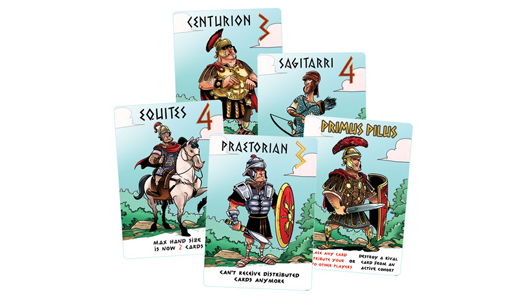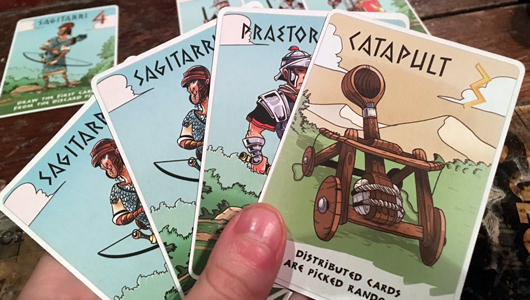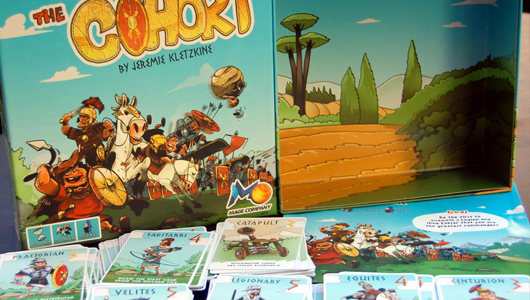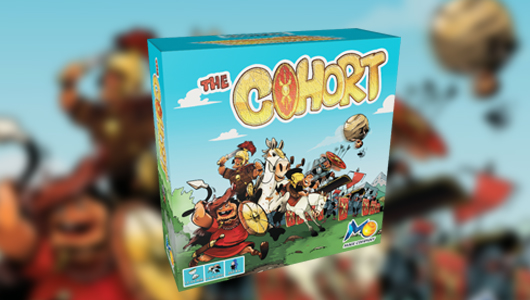Lately, I have found myself reaching for fast paced, smaller board and card games, with a sense of humour, rather than 5 hour board game monoliths. I enjoy these carefully time controlled experiences that manage to give me and others playing around the table a short burst of fun without overstaying their welcome or becoming overbearing. If that sounds like something you enjoy as well, then you will like The Cohort.
• Designer: Jeremie Kletzkine
• Publisher: Mage Company
• Number of Players: 2-6
• Playing Time: 15-30 mins

The Cohort is a fast paced tactics-light card game, where players try to collect three complete sets of cards of the same unit to win the game. The theme is based on the Roman Legionnaires and has a lot of humour in its artwork and in its mechanics.
The rules are very simple. At the beginning of their turn, the player takes two cards from the main deck, keeping one of them and passing the other to the player of their choosing. Following that, the player may place one card on the table to start building their cohort or add a card to their existing cohort. Finally, they will discard down to four cards. Various cards units will require different numbers of cards to complete the cohort. For example, the player will need 5 Velites cards to complete a set, while they will need only three Legionaries cards to complete that set. To balance it out, the main deck will have a greater number of Velites cards than Legionaries. Even though only three cohorts are needed to end the game, there is no limit on how many sets players can start. However, they might not want (in fact, it is unadvisable) to play all their cards on the table. Each different unit has their own ability, which works against the player. Velites need to deal out an extra card to an opponent, Praetorian doesn’t allow a player to receive cards from other players, Equites decreases maximum hand size down to two cards. Once a cohort is completed, the cards are turned over and their powers are no longer in effect. The player who completed cohort will also make another player discard all cards from their hand.

Although the game might give the impression that strategy plays a prominent part in its mechanics, luck is a more of a predominant factor. This could be fun but also is a times frustrating. It is really hard to formulate any kind of plan just by looking at your starting hand, knowing that by the end of your turn, you will be discarding down to four cards. There is, however, also a fun side to it too. There were several times when I played a card thinking they would be easy to collect and also that they were the least harmful to me, only not to be able to get any additional cards of that cohort in my hand either through the main deck or from the opponents. This resulted in me starting a new cohort, just to keep up with other players, and hence burdening myself with more negative powers. While that might sound frustrating, playing around the powers working against you is actually fun.

I also like that cards get passed around a lot in the game. This makes everyone engaged and invested around the table, making sure that everyone participates all the time in the game, versus just being active when it is their turn to play cards. Having said that, there are some mechanics that hinder that as well. For example, Praetorians’ power makes it impossible for other players to pass cards to you. If, while your Praetorian is active someone made you discard all your cards (through completing their cohort) that instantly limits the choice of cards in your hands. While this doesn’t immediately destroy your chances of winning the game – I played with someone who won despite that situation – it slows down the game a lot. The game is fun, when everyone has more cards than they needed or allowed to have in their hand. It makes you consider carefully which cards to discard and in which order (as there are cards, with powers allowing to draw from the discard pile) as well as being strategic about which cards you pass along – what if you are giving someone a card that they are collecting thus helping them to win?
The card’s powers are core to the gameplay. They are what makes this game fun, competitive and what allows you to mess up with other players. However, not all powers are universally great. I know they are supposed to be powers that work against you, but some of them are so punishing that no one ever collects those units. For example, Equites, where your card limit becomes two. This is a cohort that is never worth building. I have played in games, where the Equites card was always passed along to another player, to be then discarded by them, and if picked up again, passed along yet again. As one of the players got frustrated over this, everyone else just made sure that when getting Equites, we would always pass it on to him. Even after getting nothing but that one unit the whole game, that player never even considered starting Equites cohort. On the bright side, we all had a laugh.

Finally, let’s move on to the most unfortunate part of this game, which despite me liking the game a lot, has lost it a point on our rating scale – the rule book. Why are main game mechanics explained on the last page of the rule book? Who knows. Why has no one bothered to spell check it? I shrug. Why over-complicate your explanations when the core rules of the game are so easy? I have no answers for you yet again.
However, even despite that, there is a lot to enjoy about The Cohort. I like the idea of negative powers, the simplicity and the accessibility of the game. I think some of the cards’ powers should have been better curated, but even so on the whole they are well balanced against each other. The Cohort is a good little game that will be perfect to start of a board gaming night and get everyone in the mood for more games.






